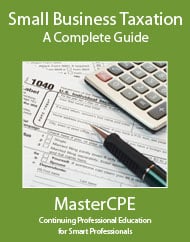Course Information
Small Business Taxation: A Complete Guide
Course Information
| Title: | Small Business Taxation: A Complete Guide |
|---|---|
| Category: | Taxation |
| Field of Study: | Taxes |
| Course Code: | T021-0106 |
| CPE Credits: | 24.0 |
| Price: | 119.95 |
Description
Description:
Americans who want to be their own boss are not entirely on their own. They have a rich uncle – Uncle Sam – who is there to help, as well as to make demands. The nation’s tax laws are intended to encourage people to start new businesses and are chock full of incentives and tax breaks, as well as sometimes onerous reporting requirements. This course is a fast-paced and entertaining guide through tax issues affecting business entities and their owners. The focus of this class is on tax devices and techniques available to the small-business owner. Emphasis will be given to operational deductions, fringe benefits, compensation, family income splitting, retirement plans, and estate planning.
Delivery Method: Online Interactive Self Study
Level: Overview
Prerequisites: None
Advanced Preparation: None
Course Details
Category: Taxation
Field of Study: Taxes
Passing Score: 70%
Technical Details: Taxes: Technical
For More Detail:
If you are unable to view PDF then right click the mouse and click save link as
Objectives
Objectives:
Chapter 1: Structure, Reporting & Accounting 1. Recognize sole proprietorships, partnerships, and corporations as organizational formats for new and existing businesses. 2. Identify how choice of entity relates to the type of records to keep, listing issues related to substantiation and documentation. 3. Specify available accounting periods and methods and the methods for identifying and valuing inventory items. Chapter 2: Business Income, Credits, & Assets 1. Identify the various types of income and their implications, including the hidden income tax dangers of cancellation of indebtedness income, tax recoveries, and depreciation recapture. 2. Specify the existing basic business and investment tax credits, naming their tax requirements, and business asset types that affect the character of gain or loss, and recognize the tax treatment on the disposition of business assets, including non-recognition transfers and Section 1231 assets.
For More Objectives:
If you are unable to view PDF then right click the mouse and click save link as
Profession
NASBA: Yes
QAS: Yes
CPA: Suitable for all CPAs
IRS: IRS credit for Enrolled Agents.
Profession Identifiers: CPA, EA

